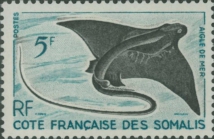WoRMS taxon details
Myliobatidae Bonaparte, 1835
Myliobatinae Bonaparte, 1835 · unaccepted > superseded rank
- Genus Aetomylaeus Garman, 1908
- Genus Myliobatis Cuvier, 1816
- Genus Pteromylaeus Garman, 1913
- Genus Aetomyleus accepted as Aetomylaeus Garman, 1908 (misspelling)
- Genus Aetomylus accepted as Aetomylaeus Garman, 1908 (misspelling)
- Genus Holorhinus Gill, 1862 accepted as Myliobatis Cuvier, 1816
- Subfamily Mobulinae Gill, 1893 accepted as Mobulidae Gill, 1893 (unaccepted > superseded rank)
- Genus Myliobates Schinz (ex Duméril), 1822 accepted as Myliobatis Cuvier, 1816
- Subfamily Myliobatinae Bonaparte, 1835 accepted as Myliobatidae Bonaparte, 1835 (unaccepted > superseded rank)
- Genus Myliobatus accepted as Myliobatis Cuvier, 1816 (misspelling)
- Subfamily Rhinopterinae Jordan & Evermann, 1896 accepted as Rhinopteridae Jordan & Evermann, 1896 (unaccepted > superseded rank)
marine, brackish, terrestrial
Not documented
Description Atlantic, Indian, and Pacific Oceans, mainly inshore in temperate and tropical seas. Medium to large, heavy-bodied fishes...
Description Atlantic, Indian, and Pacific Oceans, mainly inshore in temperate and tropical seas. Medium to large, heavy-bodied fishes with a lozenge-shaped disc that is much wider than long. Head differentiated from disc and elevated; the mouth is broad, located ventrally, and has plate-like teeth arranged in 1-7 rows. Eyes and spiracles on sides of head. Size of gill openings almost the length of eye. Length of tail much greater than disc. Some with poison spines. Dorsal fin small. Caudal fin lacking. Pectoral fins opposite the eyes very small or absent. Anterior subdivision of pectoral fin fuses below tip of snout giving rise to a subrostral lobe. Some known for their leaping ability high into the air. Viviparous with 2-6 young. [details]
Froese, R. and D. Pauly. Editors. (2024). FishBase. Myliobatidae Bonaparte, 1835. Accessed through: World Register of Marine Species at: https://www.marinespecies.org/aphia.php?p=taxdetails&id=105710 on 2024-04-20
Date
action
by
![]() The webpage text is licensed under a Creative Commons Attribution 4.0 License
The webpage text is licensed under a Creative Commons Attribution 4.0 License
taxonomy source
Van Der Laan, R.; Eschmeyer, W. N.; Fricke, R. (2014). Family-group names of Recent fishes. <em>Zootaxa.</em> 3882(1): 1-230., available online at https://doi.org/10.11646/zootaxa.3882.1.1 [details] Available for editors  [request]
[request]
context source (PeRMS) Chirichigno, N.; Cornejo, M. (2001). Catálogo comentado de los peces marinos del Perú. <em>2ª ed. Instituto del Mar de Perú. Publicación Especial. Callao.</em> 314 p. [details]
basis of record van der Land, J.; Costello, M.J.; Zavodnik, D.; Santos, R.S.; Porteiro, F.M.; Bailly, N.; Eschmeyer, W.N.; Froese, R. (2001). Pisces, <B><I>in</I></B>: Costello, M.J. <i>et al.</i> (Ed.) (2001). <i>European register of marine species: a check-list of the marine species in Europe and a bibliography of guides to their identification. Collection Patrimoines Naturels,</i> 50: pp. 357-374 (look up in IMIS) [details]
additional source Fricke, R., Eschmeyer, W. N. & Van der Laan, R. (eds). (2024). ECoF. Eschmeyer's Catalog of Fishes: Genera, Species, References. <em>California Academy of Sciences. San Francisco.</em> Electronic version accessed dd mmm 2024., available online at http://researcharchive.calacademy.org/research/Ichthyology/catalog/fishcatmain.asp [details]
context source (PeRMS) Chirichigno, N.; Cornejo, M. (2001). Catálogo comentado de los peces marinos del Perú. <em>2ª ed. Instituto del Mar de Perú. Publicación Especial. Callao.</em> 314 p. [details]
basis of record van der Land, J.; Costello, M.J.; Zavodnik, D.; Santos, R.S.; Porteiro, F.M.; Bailly, N.; Eschmeyer, W.N.; Froese, R. (2001). Pisces, <B><I>in</I></B>: Costello, M.J. <i>et al.</i> (Ed.) (2001). <i>European register of marine species: a check-list of the marine species in Europe and a bibliography of guides to their identification. Collection Patrimoines Naturels,</i> 50: pp. 357-374 (look up in IMIS) [details]
additional source Fricke, R., Eschmeyer, W. N. & Van der Laan, R. (eds). (2024). ECoF. Eschmeyer's Catalog of Fishes: Genera, Species, References. <em>California Academy of Sciences. San Francisco.</em> Electronic version accessed dd mmm 2024., available online at http://researcharchive.calacademy.org/research/Ichthyology/catalog/fishcatmain.asp [details]
 Present
Present  Inaccurate
Inaccurate  Introduced: alien
Introduced: alien  Containing type locality
Containing type locality
From other sources
Description Atlantic, Indian, and Pacific Oceans, mainly inshore in temperate and tropical seas. Medium to large, heavy-bodied fishes with a lozenge-shaped disc that is much wider than long. Head differentiated from disc and elevated; the mouth is broad, located ventrally, and has plate-like teeth arranged in 1-7 rows. Eyes and spiracles on sides of head. Size of gill openings almost the length of eye. Length of tail much greater than disc. Some with poison spines. Dorsal fin small. Caudal fin lacking. Pectoral fins opposite the eyes very small or absent. Anterior subdivision of pectoral fin fuses below tip of snout giving rise to a subrostral lobe. Some known for their leaping ability high into the air. Viviparous with 2-6 young. [details]
| Language | Name | |
|---|---|---|
| English | manta rayseagle rays | [details] |
| Japanese | トビエイ科 | [details] |
| Norwegian Bokmål | ørneskatefamilien | [details] |
| Norwegian Nynorsk | ørneskatefamilien | [details] |
| Swedish | örnrockor | [details] |
